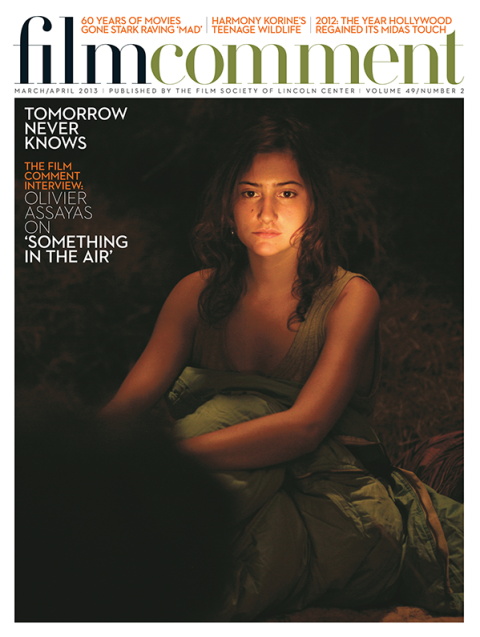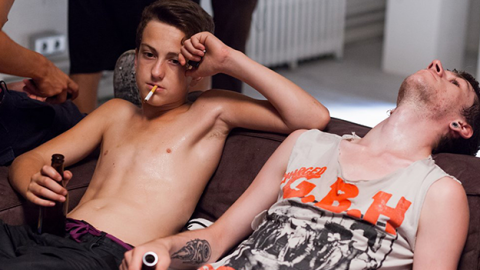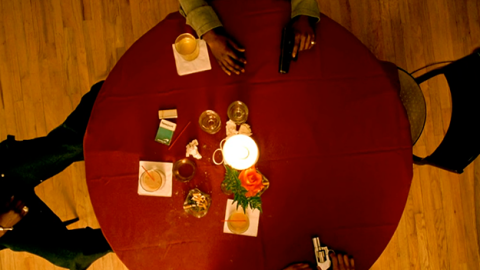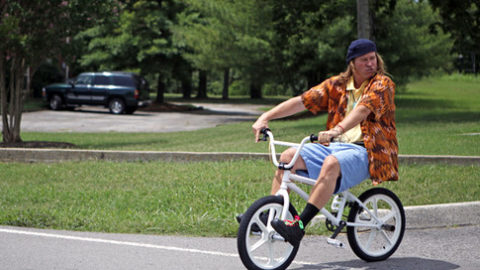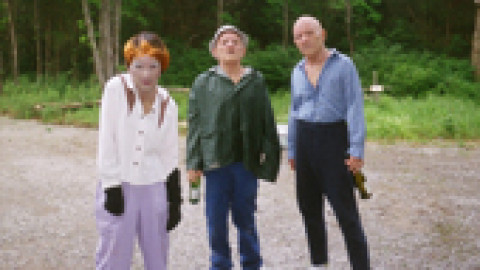
Unfolding like a spiraling, intoxicated dream, Spring Breakers is a vision of American pop culture’s progeny running amok. It’s a surreal fantasy that ranks among recent cinema’s most memorable visions of Hell. Drawing inspiration from several ongoing narratives in contemporary American life, Harmony Korine’s fifth feature mines what Norman Mailer once characterized as “the subterranean river of untapped, ferocious, lonely, and romantic desires, the concentration of ecstasy and violence that is the dream life of the nation.” A paean to higher education’s annual bacchanalia—starring two bikini-clad alumni of the Disney factory—Spring Breakers transcends the teensploitation trappings of recent commercial films like last year’s Project X by introducing chimerical characters, partly derived from “real life,” partly fabricated, who are the fun-house-mirror reflections of the triumphant hallucinations of our culture.
Korine, who turned 40 in January, first won acclaim and notoriety with the semiautobiographical screenplay he wrote for Larry Clark’s Kids (95). A still startling portrayal of disaffected urban teens, Kids cuts across boundaries of class and race to depict, with near ethnographic accuracy, the debased values of an ever increasing portion of America’s youth. Spring Breakers focuses on the cultural heirs to the doomed protagonists of Kids: Nineties babies, who grew up with the Internet, whose sensibilities have been shaped by the sweeping technological changes that have taken place in the interval between the Clinton and Obama eras, and whose adolescence corresponds with an American decade haunted by terrorism, war, and torture in the immediate aftermath of 9/11.
Spring Breakers imagines these children of Bush and Adderall coming home to roost—a generation for whom the absence of any utopian ideals is expressed through a profane materialism, a worldview constructed from a pastiche of video game ultraviolence, reality television, hip-hop braggadocio, superhero vigilantism, Internet porn, viral YouTube videos, and the right-wing get-rich-or-die-trying anarchism that aligns Tony Montana, 50 Cent, and Dick Cheney in the cultural ether.
Updating the basic premise of the 1960 genre-defining spring-break movie Where the Boys Are, Spring Breakers introduces us to Faith (Selena Gomez), Cotty (Rachel Korine), Brit (Ashley Benson), and Candy (Vanessa Hudgens), undergraduates at an unspecified provincial university who are long on boredom and short on cash. They dream of escaping the monotony of their lives in which “everything is the same and just sad” and leaving behind the prison of their empty dormitory to be with their peers in St. Petersburg, Florida. We first encounter ambisexual, petulant, and spiritually conflicted Faith in Bible study discussing I Corinthians 10:13 (“And God is faithful; he will not let you be tempted beyond what you can bear. But when you are tempted, he will also provide a way out. . . ”).

Meanwhile, her three friends, possessed by darker, more ambiguous forces, plot to steal a professor’s car and hold up a local Chicken Shack. Using toy guns, the trio chant a diabolical mantra as they cross the threshold from fantasy violence to the real thing: “You can’t be scared of shit . . . Just pretend like it’s a video game . . . Act like you’re in a movie or something . . . You’ve got to be hard . . . Just get this fucking money . . . .” Afterward, exhilarated by the ease of their success, they replay the steps of their robbery for Faith; only now its daring and savagery is transmogrified, replayed in their collective imagination as if it were a heist out of a Hollywood movie, perpetrated by hardened, remorseless criminals.
Using their earnings to rent motor scooters, the girls roll into St. Petersburg and quickly catch up with the rowdy, booze-fueled horde who, like Mongols, have overrun the town’s beaches and hotels. Scenes of orgiastic, sense-derailing abasement are lovingly rendered in slow-motion 35mm by cinematographer Benoît Debie, who pays homage to the unlovely chaos of Bruegel and Bosch, their pathos amplified by Faith’s exclamation that “this is the most spiritual place we’ve ever been.”
This road of excess leads to the palace of Alien (James Franco), a local drug dealer, thief, and rapper riding a small wave of Internet fame. Only Faith shows any resistance to Alien’s rank advances; her friends avidly accept the deluded promise of wealth and adventure offered by this foul caricature of the American dream. Together they embark on a violent robbery spree, consecrating their union in a scene that suggests the divine madness of Dionysus and his maenads. Toting guns and disguised in pink balaclavas, Cotty, Brit, and Candy dance around Alien to Britney Spears’s “Everytime.” In the accelerated whirl of American culture, no Mouseketeer has gone further, flamed out more spectacularly, or rebranded themselves more brightly than Britney. A pop star born of America’s pornographication, her example hovers over Spring Breakers like a presiding deity.

In the run-up to the film’s release, there’s been a small amount of hype surrounding the fact that Alien is based, in part, on the real-life Internet rapper and performance artist Riff Raff, aka Jody Highroller, aka The Neon Icon. For those unacquainted with the fecund culture of Obama-era hip-hop, Houston-born Riff Raff is a self-created universe unto himself—a charismatic white rapper with a penchant for absurd rhyming couplets who dresses like the cartoon mascot of a breakfast cereal (for a taste of Riff’s sartorial splendor, type “Versace Python” into YouTube). Franco incorporates elements of Riff Raff’s style and persona (recently the performer has taken to calling himself the “Rap Game James Franco” and purports to be coming out with a book in which Korine will decode his tweets).
But the resemblance doesn’t go very deep. Riff Raff is a hip-hop satirist who playfully, often brilliantly, toys with the genre’s clichés and tropes of wealth and fame, luxuriating in the aura of his own celebrity. Alien, on the other hand, embodies the raw image of the homicidal maniac hell-bent on using violence to realize romantic dreams of wealth and power. (In a recent interview in Complex magazine, Franco also acknowledged drawing inspiration for the character from a relatively unknown St. Petersburg rapper named Dangeruss. Alien performs his “Hangin’ With Da Dope Boys” in the film, and the video, viewable on YouTube, was directed by Franco.)
As a contrast to Alien, the film posits his former mentor Big Arch, played with steely menace by Atlanta rapper Gucci Mane. A former drug dealer, Gucci is a pioneer of the rap genre known as “trap” that has become one of its most popular and emulated styles. Trap music has traditionally been associated with the hyper-violent world of the drug gangs responsible for the spike in homicides in Chicago, Philadelphia, and Detroit (“trap” being underworld slang for the location in which cocaine is baked into crack). While the mannerisms of Franco’s Alien are appropriated, Gucci essentially plays himself in the film. Big Arch’s one-to-one correlation with the hip-hop personage of Gucci Mane (né Radric Davis) brings a next-level twist to the film’s reality/illusion game. Here the artist’s own self-mythologizing is brought to dramatic realization on screen. In the shame-and-honor culture of the streets, it’s the recognition of invulnerability that confers power, and in Spring Breakers, Big Arch reigns supreme as the street king of St. Petersburg, the position that Alien covets most.
The film ends on a note as cathartic as it is improbable, but what definitively sets Korine’s film apart from other spring-break movies is that sex is no longer the frontier. In the post–Girls Gone Wild era, fantasies of crime, violence, and power carry deeper resonance than endless images of topless teens screaming down the fleeting beauty of their youth. As the epic poets of our age rap about tales of survival and mimetic violence, promoting fictions that are reconstituted in the popular imagination as truth, America’s love affair with what J. Hoberman has characterized as “the righteous outlaw”—from Clint Eastwood to Gucci Mane—is confirmed. Spring Breakers seizes on these celebrity phantasms and presents them as what they are: agents of our deepest, most perverse fantasies. If you want to see one film about the state of our union that features a gun-toting, corn-rowed James Franco seducing the ex-girlfriend of Justin Bieber, this is it.



